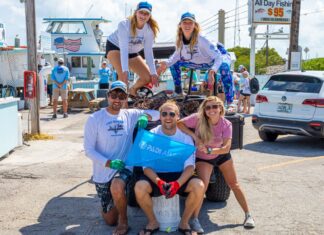by Sarah Thomas
It used to be a simple directive from doctors to patients, parents to children: “Eat your fruits and veggies.” But as time has gone on and the choices in the produce section — and high stakes of choosing wrong — can be overwhelming. The language of fruits and vegetables has grown too; we now consider whether they’re “organic” and “sustainably produced.”
Fortunately, organizations like the Environmental Working Group (EWG) act as watchdogs on the agriculture industry and the Food and Drug Administration, testing foods for chemical content. The EWG has tried to simplify the process of choosing whether or not to buy organic, i.e. free of pesticides. Organic produce is often more expensive, so it can be a battle between the wallet, and the desire to be health-conscious.
The EWG published lists they dub “The Dirty Dozen” and “The Clean Fifteen,” the fruits and veggies that have the most pesticides when conventionally grown and those that have the least pesticides when conventionally grown. So, while it’s no big deal to buy a regular old cauliflower from The Clean Fifteen, it’s probably wise to go organic on the carton of strawberries on The Dirty Dozen. (Take a screenshot of the list on the opposite page to keep as a handy reference at the grocery store.)
We all want to make the best possible choices for our bodies and our families, but sometimes, it’s easy to grab what’s most familiar, cheapest and easiest. While those factors are important, there are others to consider for the most health benefits—and fewest dangers—for ourselves and our families. This can be doubly tricky in the Keys, where there isn’t nearby farmland and much of the produce has to travel many miles before it arrives here at our grocery stores.
With all these factors to juggle, we try to simplify the process, using options at a local grocery store for comparison. Food writer Michael Pollan said it best: “Eat food, not too much, mostly plants.”
When shopping at the grocery store, there are several questions you should ask about fruits and veggies. They are guided by the two key questions: Is this good or bad for my body? And: Is this good or bad for the environment around me? The questions we asked to help guide our choices below are:
• Is it organic, or was it treated with pesticides?
• Is it grown locally or did it travel far?
• Is it packaged in plastic or not?
• Is it expensive, moderate or affordable?
Instead of precut pineapple, which is more expensive, packaged in plastic, and is more vulnerable to picking up salmonella and e coli, opt for a whole pineapple which is on The Clean Fifteen. Even better, go for a regionally grown starfruit, which didn’t travel as far and is less expensive!
Instead of conventionally-grown tomatoes that came from California, go for the Florida tomatoes, or even better yet, go for the organic tomatoes. While it’s too bad they’re in plastic packaging, tomatoes are on The Dirty Dozen, which means the non-organic tomatoes show significant levels of chemical contamination.
Instead of conventional pre-packaged kale, go for the organic spinach. Better yet, buy the unwrapped organic kale. Ditch the extra waste and the extra cost—the organic kale is cheaper than the pre-packaged stuff.
Instead of conventional strawberries, which show high chemical levels and are on The Dirty Dozen, go for the less expensive and safer blueberries, or better yet, raspberries. Do a quick Internet search of the brand—Driscoll’s has been recognized by environmental agencies for being responsible growers and farming advocates.
THE DIRTY DOZEN
Strawberries | Spinach | Kale | Nectarines | Apples | Grapes
Peaches | Cherries | Pears | Tomatoes | Celery | Potatoes
THE CLEAN FIFTEEN
Avocados | Sweet Corn | Pineapples | Frozen Sweet Peas | Onions
Papayas | Eggplants | Asparagus | Kiwis | Cabbages | Cauliflower
Cantaloupes | Broccoli | Mushrooms | Honeydew Melons





















